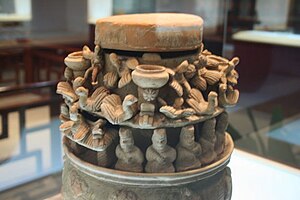Eastern Wu
It previously existed from 220 to 222 as a vassal kingdom nominally under Cao Wei, its rival state, but declared complete independence in November 222.
Sun Ce broke off relations with Yuan Shu around 196–197 after the latter declared himself emperor—an act deemed as treason against Emperor Xian, the figurehead ruler of the Han dynasty.
Sun Quan, like his elder brother, also paid nominal allegiance to Emperor Xian while maintaining autonomous rule over the Wu territories.
Guan Yu, who was defending Liu Bei's assets in Jing Province, was captured and executed by Sun Quan's forces.
In 222, Liu Bei launched a military campaign against Sun Quan to take back Jing Province and avenge Guan Yu, leading to the Battle of Xiaoting.
However, Liu Bei suffered a crushing defeat at the hands of Sun Quan's general Lu Xun and was forced to retreat to Baidicheng, where he died a year later.
During Sun Liang's reign, two rebellions broke out in the Wei garrison at Shouchun (around present-day Shou County, Anhui) in 255 and 257–258.
In the beginning of Sun Hao's reign, the emperor reduced taxes, gave relief to the poor, and granted freedom to a large number of palace maids.
However, Sun Hao gradually became more cruel and superstitious and started indulging in wine and women instead of finding ways to revive his declining state.
Migrations from the north and the needed settlement from the Shanyue barbarians made it possible for the increase in manpower, agriculture, and settling the lower most parts of Wu.
[15] The language of Eastern Wu was identified with Old Jiangdong (古江東方言), the speech of the Jiangdong area (Jiangxi, Zhejiang, Fujian, Southern Anhui, Jiangsu); this dialect, which was already different from northern speech, is described in Shishuo Xinyu 世说新语 by Liu Yiqing (刘义庆, 403-444), which narrates that Wang Dao learned the idiom after fleeing in Jiankang, today's Nanjing.
[17] Nevertheless, every Wu army was in need of administrative support and, according to Rafe de Crespigny, certain scholars were "recognised as practical counsellors, regardless of their fighting prowess or their ability to command troops in the field.
"[17] Under the reign of Sun Quan, he needed a strong role of advisors and secretaries in order to keep his link of power in a maintained level.
Sun Quan's prestige in dealing with hostiles and friendly relations called for the establishment of a controlled form of an imperial government for the empire of Wu.
Sun Quan also created the opportunity for people residing within Wu to gain prestige and influence throughout the empire and the surrounding establishments with the duty of being an envoy.
[17] Following the death of Cao Pi in 226, Sun Quan strongly promoted his kingdom to focus on agriculture because the threat from Wei was lifted.
[19] However, in 240, Sun Quan restrained Lu Xun's idea and refocused on agricultural works, because Wu came to suffer a severe famine.
[21] Under the rule of Wu, the Yangtze River Delta region, regarded in early history as a barbaric "jungle", developed into one of the commercial, cultural, and political centres of China.
The achievements of Wu in the south marked the coming of Chinese civilization to the farthest southern reaches of the empire.
Such things cost Wu, and the achievements supposedly gained within Taiwan did not cover this problem and Sun Quan lost his vassal.
When Guanqiu Jian and Wen Qin rebelled against Wei, Wu promised to help the two in Shouchun (around present-day Shou County, Anhui).
[24] During the conquest of Shu by Wei in 263, Wu could not fully lend support to their allies due to a revolt in Vietnam.
Zhuge Ke was assassinated by Sun Jun in 253 after a failed invasion of Hefei following the Wu victory over an invading Wei force at Dongxing.







